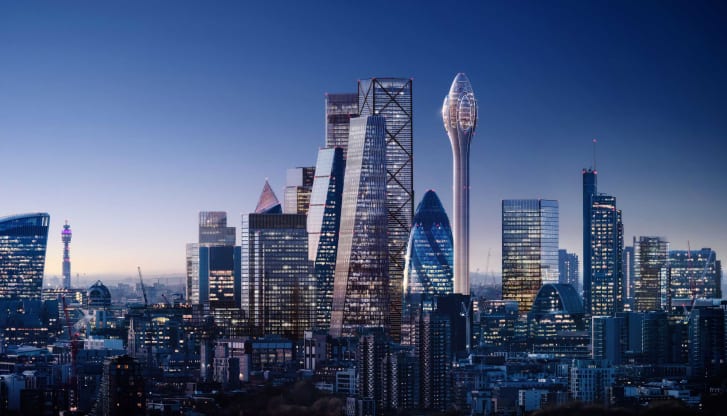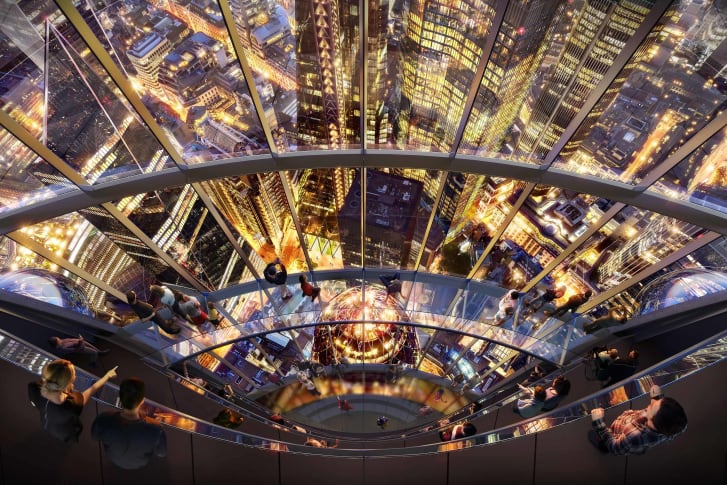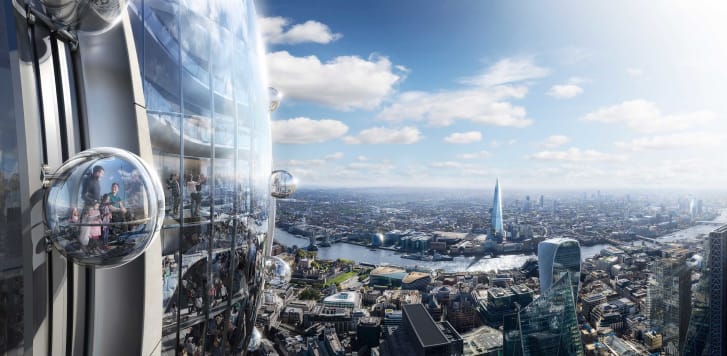London's mayor blocks plans for controversial 'Tulip' skyscraper
- DATE: Jul 16, 2019
- |
- CATEGORY: MARKET TRENDS
- |
- AUTHOR: OPulse Admin
London's mayor Sadiq Khan has blocked plans for a controversial tower known as the Tulip, saying the structure would be of "limited" public benefit and "detrimental" to the capital's skyline. In a letter explaining the decision, Khan said the proposal "would not constitute the high standard of design required," and that it would "cause harm to the historic environment, the wider skyline and image of London." The move comes less than four months after city authorities gave a green light to the 1,000-foot-high attraction, which would have become the second-tallest skyscraper in western Europe upon opening in 2025.
 The proposed design was set to be built amid a cluster of other skyscrapers in the City of London. Credit: DBOX for Foster + Partners
Designed by the prominent architect Norman Foster's firm, Foster + Partners, the proposed tower featured viewing platforms, restaurants and educational facilities for children. The design also envisaged a collection of rotating glass pods that would transport visitors around the building's exterior.
But the proposal attracted criticism from social media users and heritage groups after it was unveiled in November 2018. London's City Airport, located just six miles away, even sought assurance from city planners that the moving pods wouldn't interfere with air traffic control systems.
Nonetheless, plans were approved by the City of London Corporation, which governs the City of London. Its Planning and Transportation Committee voted 18-7 in favor of the project in April.
The proposed design was set to be built amid a cluster of other skyscrapers in the City of London. Credit: DBOX for Foster + Partners
Designed by the prominent architect Norman Foster's firm, Foster + Partners, the proposed tower featured viewing platforms, restaurants and educational facilities for children. The design also envisaged a collection of rotating glass pods that would transport visitors around the building's exterior.
But the proposal attracted criticism from social media users and heritage groups after it was unveiled in November 2018. London's City Airport, located just six miles away, even sought assurance from city planners that the moving pods wouldn't interfere with air traffic control systems.
Nonetheless, plans were approved by the City of London Corporation, which governs the City of London. Its Planning and Transportation Committee voted 18-7 in favor of the project in April.
 The 1,000-foot-high attraction would have become the second-tallest skyscraper in western Europe. Credit: DBOX for Foster + Partners
But Khan moved to intervene Monday, exercising his power to refuse planning permission to any proposals in the city. Expressing concerns about the impact on "strategic views," the mayor cited additional worries about inadequate cycle parking and public spaces. His letter added that the project would result in a "poor quality, unwelcoming, unnecessarily confined pedestrian environment."
The 1,000-foot-high attraction would have become the second-tallest skyscraper in western Europe. Credit: DBOX for Foster + Partners
But Khan moved to intervene Monday, exercising his power to refuse planning permission to any proposals in the city. Expressing concerns about the impact on "strategic views," the mayor cited additional worries about inadequate cycle parking and public spaces. His letter added that the project would result in a "poor quality, unwelcoming, unnecessarily confined pedestrian environment."
Divided opinions
The heritage group Historic England, a longstanding critic of the design, welcomed Monday's decision. In a statement it described the building as "essentially a tall lift shaft with a bulge on top," adding that the proposal would have caused "permanent and irreversible damage to... the image and identity of the capital." The group behind the proposal, the Tulip Project, has claimed that the attraction would welcome 1.2 million visitors a year, creating hundreds of jobs and injecting £970 million ($1.2 billion) into London's economy by 2045. Despite high-profile criticism, a Comres poll commissioned by the project's planners found that 65% of the 1,011 Londoners polled thought it would be an "attractive" addition to the skyline. In a statement emailed to CNN, the Tulip Project said it was "disappointed by The Mayor of London's ... direct refusal of planning permission, particularly as the Tulip will generate immediate and longer-term socio-economic benefits to London and the UK as a whole." The group declined to comment on whether it would submit revised plans for the site, saying it would "now take time to consider potential next steps" for the project. The design featured moving glass pods to take vistors around the building's exterior. Credit: DBOX for Foster + Partners
In 2008, the Mayor of London's powers were significantly expanded to include the authority to refuse planning permission to buildings deemed contrary to the London Plan -- the city's spatial development strategy -- or "otherwise contrary to good strategic planning in Greater London." Yesterday's decision marks the 10th time that Khan has exercised this power since his election in 2016, according to official records.
Khan's predecessor Boris Johnson -- now the front-runner to be named Britain's new prime minister -- used the power on seven occasions. In 2009, he also used his mayoral authority to overrule local concerns and approve a controversial £450 million ($562 million) tower in East London, although the project was eventually shelved.
The design featured moving glass pods to take vistors around the building's exterior. Credit: DBOX for Foster + Partners
In 2008, the Mayor of London's powers were significantly expanded to include the authority to refuse planning permission to buildings deemed contrary to the London Plan -- the city's spatial development strategy -- or "otherwise contrary to good strategic planning in Greater London." Yesterday's decision marks the 10th time that Khan has exercised this power since his election in 2016, according to official records.
Khan's predecessor Boris Johnson -- now the front-runner to be named Britain's new prime minister -- used the power on seven occasions. In 2009, he also used his mayoral authority to overrule local concerns and approve a controversial £450 million ($562 million) tower in East London, although the project was eventually shelved.




